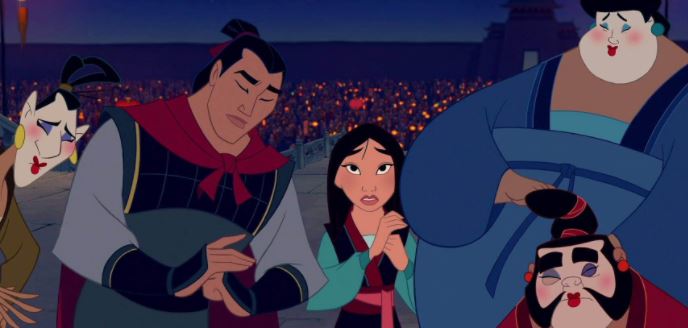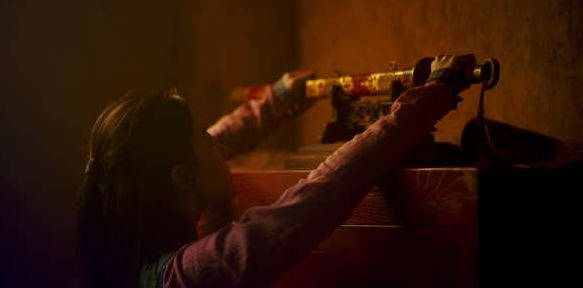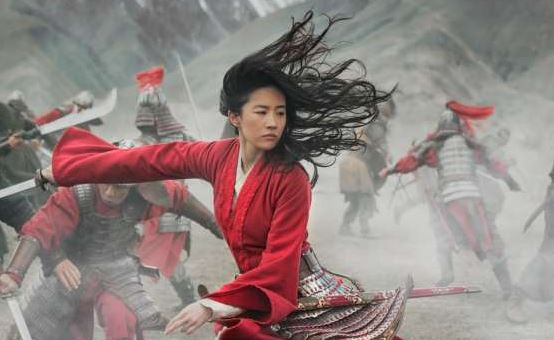By Jana Monji, AsAmNews Art & Culture Correspondent
On the week that BTS reached the number one spot on the Billboard Hot 100, the live-action Mulan, after many delays, drops on Disney + today for subscribers who are willing to pay extra cash. Even as a musical, Mulan was a troubled depiction of China, and under the direction of Niki Caro (Whale Rider) the live-action version isn’t a cohesive production.
The live-action film had its Hollywood premiere on March 9, 2020, but due to the closing of movie theaters because of the pandemic, the original March 27, 2020 release was cancelled. The July opening became an August opening. The decision was made to put it on Disney + with a premium fee.
Mulan (1998)
The animated feature came out in 1998 with Ming-Na Wen as the voice of Fa Mulan and Lea Salonga as the singing voice. BD Wong voiced her love interest, Captain Li Shan with Donny Osmond providing the singing voice. Eddie Murphy was Mushu, a pipsqueak dragon. Miguel Ferrer voice Shan Yu, the evil leader of the Huns.
LATEST STORIES
The grey-skinned Huns use grappling hooks to scale the Great Wall of China and begin their invasion of Han China. The emperor decrees that every family will supply one man to enter the imperial army.
Mulan is the eldest of two daughters who has already had a disastrous encounter with a matchmaker. Her father, Fa Zhou, had fought in the army before and is determined to go. Before he can join the army, Mulan cuts her hair and steals her father’s armor and sword and rides away. The sword has three Chinese characters engraved on it: 忠勇真 (loyal, brave and true). With her, she takes her “lucky” cricket. Learning of her departure, her grandmother prays to their ancestors for protection and the ancestors decide to send the large stone dragon to watch over her. Mushu, is the messenger, but after he destroyed the stone dragon instead of awakening it, he takes its place.

Mulan joins the army training camp with Mushu advising her how to act like a man. Under the command of Li Shang, Mulan and her new-found friends, Yao, Ling and Chien-Po train. Mulan uses her brains to overcome one of the training drills. The army’s first assignment takes them to the mountains to join Li Shang’s father, General Li. Instead, the troop finds the encampment burned down; the general and his troops were killed by the Huns.
The Huns haven’t left the area and ambush Li Shang and his army. Mulan uses a Huolongchushui cannon to start an avalanche. Most of the Huns are swept away, but the leader of the Huns, Shan Yu wounds her. When Mulan is treated, her gender is revealed (off screen). Li Shang spares her life, but orders her to leave the army. Left behind, Mulan discovers that Shan Yu and the surviving Huns are heading to the imperial city.
Mulan arrives at the imperial city and can’t convince Li Shang that the Huns will attack. The Huns capture the imperial palace and take the emperor prisoner. Yao, Ling, and Chien-Po pose as concubines to infiltrate the palace. With Li Shang, Mulan, Yao, Ling, and Chien-Po defeat the Huns. Mulan, with the help of Mushu, pursues and kills Shan Yu.
After scolding Mulan for shaming the army and her family, the emperor gives Mulan the crest of the Emperor and the sword of Shan Yu and offers her a position in the imperial army. Mulan declines the position and returns to her family. Li Shang follows her, returning her father’s helmet, but gets invited to dinner. Mushu gets elevated to family guardian, a position he has lost due to a previous indiscretion.
Eddie Murphy’s Mushu had a number that seemed more Southern Christian church than anything Chinese. The soundtrack featured 98° and Stevie Wonder and Christina Aquilera (end credits rendition of “Reflection.” Lea Salonga sang the second track and the first version of “Reflection.” Harvey Fierstein, James Hong, Jerry Tondo, Lea Salonga and Matthew Wilder sing “A Girl Worth Fighting For.”
International version featured bonus tracks with Asian voices. Japanese rock band Luna Sea perform Breathe. Hong Kong-born American Coco Lee did a pop version of Reflection for the Chinese bonus track. American-born Korean pop singer Lena Park performs Eternal Memory and Reflection.
Mulan (2020)
If you’ve seen the poster or the trailer for the live-action Mulan, you’ll already know that her hair-cutting scene has been cut. Also thrown out are Mushu but not the cricket.
After the obligatory Disney castle introduction, the film shows us dawn in the mountains of China and a voice over (Tzi Ma) says, “There have been many tales of the great warrior Mulan, but ancestors, this one is mine.” A young Mulan (Crystal Rao) is shown training in the field with her father who calls her “a young shoot, all green.” Then he asks the question: “If you had such a daughter with qi speaking to her every motion,” what would one do? Does one attempt to squelch her natural gifts?
In the fields training with her father, Hua Zhou (Tzi Ma), Mulan may be serene, but in the village, a circular structure with a round central courtyard, she is chaos. When a chicken refuses to go into an uncovered pen, Mulan chases it up to the second story and on to the roof. Hearing the noise, Mulan’s mother, Hua Li (Rosalind Chao), asks her younger daughter, Hua Liu (Xana Tang), “Tell me your sister is not the cause of this.” Seeing Mulan’s spirited pursuit, she admonishes, “Mulan, Take control of yourself.” The chicken flaps down, finally entering the pen, but Mulan acrobatically descends. Unfortunately, during this fiasco, she has broken the wing off of the phoenix statue that guards the family’s front door.
While her father indulgently smiles, her mother worries. A daughter should bring honor through marriage. Her father comforts Mulan who is trying to fix the statue, telling her that the phoenix is “the essence of our ancestors.”
In the desert on the western border of China (the subtitle reads “Silk Road: Northwest China”), a man leading Bactrian camels sees a woman, Xian Lang (Gong Li), rise from the heat waves of the sand like a mirage. She enters the body of the man. As that trader, she enters a gated city. Black-clad Rouran led by Bori Khan (Jason Scott Lee) ride up on their black horses, seemingly immune to the arrows shot from the city. They literally run up the walls (the Huns in the animated feature used grappling hooks to scale the walls). Xian Lang causes confusion within the city and the city falls. Xian Lang then chooses a soldier and takes over his body.

The soldier goes to the Imperial City in Central China and reports that six of the northern garrisons have fallen to the Rouran. Told that the leader is Bori Khan, the son seeking revenge for the death of his father, also named Bori Khan. Bori Khan is reported to be fighting alongside a powerful witch. But the emperor is “not afraid of dark magic.” The emperor decides he must build an army.
Elsewhere in a large circular tent (yurt), Xian Lang listens to Bori Khan, attempting to assert herself. Bori Khan tells her “the emperor will be mine to kill” and that she’s been a “useful” witch. Xian Lang tells him that she’s not a witch, but a warrior. He reminds her that when he found her she was like a scorned dog and “when we finish that dog will have a home.”
Mulan has grown into Liu Yifei. Riding her horse home, she sees two rabbits running side by side. The CGI doesn’t make them seem rabbity. This scene seems meaningless, but is reference to the Mulan poem:
The male hare wildly kicks its feet;
The female hare has shifty eyes,
But when a pair of hares run side by side,
Who can distinguish whether I in fact am male or female?
As with the animated feature, Mulan has a disastrous interview with the matchmaker (Cheng Pei-pei), but instead of a cricket causing some of the chaos, it is a spider. Mulan attempts to hide it under a teapot, but when ordered to move the teapot, she reluctantly reveals the spider which jumps at the matchmaker. Mulan becomes a circus act, first acrobatically catching the tea cups and teapot when the matchmaker overturns the table, and then letting them fall and break on the floor.
Just as Mulan is fleeing in disgrace, the emperor’s edict comes. You know the spiel: “Every family must contribute one man to fight; one man from every house.” Mulan’s father takes the scroll for his family, leaving his ornate crutch behind. When he falls, the family lets him retain his dignity by allowing him to rise on his own. Yet it is clear: Hua Zhou with his bad leg isn’t fit to serve in any army and will be unlikely to return.

That night, Mulan steals her father’s sword, armor and horse and takes the scroll to join the army. In line, she meets Cricket (Jun Yu), Ling (Jimmy Wong), Chien-Po (Doua Moua), Yao (Chen Tang) and Chen Honghui (Yoson An). Cricket was “born under an auspicious moon” and thus is a good luck charm. The new recruits train under Commander Tung (Donnie Yen) and Sergeant Qiang (Ron Yuan). When the recruits strip down to their underwear (looks like what the Japanese call fundoshi), and prepare for the “showers,” Mulan, now known as Hua Jun, volunteers for night duty. You might, like me, wonder just shower plumbing works.
Mulan avoids bathing until the other recruits complain. That evening, she attempts to bath in still water, but is joined by Chen Honghui. He attempts to befriend her, feeling they started out badly, but she turns her back on him, fearing being discovered. Mulan tells him, “I am not your friend.” Chen Honghui tells her that while she might turn her back on him, Hua Jun should not turn his back on the others in their small group.
The recruits train and improve in their training exercises. Mulan is finally able to carry buckets (without a carrying pole or yoke) up the steps of a steep mountain. Cricket proves to be a skilled archer. At one point Mulan summons up the courage to reveal her deception, but receiving praise from Commander Tung, she loses her determination. Tung intimates that he would be happy to have Hua Jun marry his daughter.
Finally the recruits as the fifth battalion march to join the fourth. When they reach the encampment, they find the fourth battalion has been slaughtered with no survivors. At the garrison, they learn where Rouran are. Believing that “he who moves first control’s the enemy,” Commander Tung prepares to attack.
Hua Jun/Mulan remembers what her father told her, “There is no courage without fear.” She tells her companions, “Listen to me. We will live; I guarantee it because I will protect you. We will protect each other.” During the battle, Hua Jun/Mulan is mounted and rides toward the Rouran. The arrows of the Rouran kill all but three of the riders. Two retreat. Mulan continues.
In a green hot springs area, she confronts and is defeated by the witch who tells her, “Your deceit weakens you” and “it poisons your qi.” The voice over tells us that “Hua Jun did die because a lie can only live for so long.” She sees the red phoenix and decides to embrace her true self.
The witch is back in the battle. Transforming from a golden eagle to a murderous murmuration, she attacks the fifth battalion. using their shields, groups form circular armored dots. The Rouran have catapults with deadly aim. Hua Jun/Mulan sees the catapult’s great ball of fire hit one such formation. She whistled for her horse and rides up above the catapult brigade.

Mysteriously, she has many helmets and places them on rocks and then fires arrows down on the catapult troop. They turn on her and cause an avalanche. Having embraced her gender, (and thrown away her helmet and armor), Mulan returns, but it rejected by her troop.
Alone, she again meets the witch who tells her, “I’ve lived a life of exile; no country, no family.” She then reminds Mulan, “You saved them today and still they turned on you.” She then asks Mulan to join her, “Merge your path with mine.”
Instead, Mulan goes to the garrison and tells the commander that the garrison attacks were just a distraction. The imperial army can’t move fast enough to catch the Rouran, but “a small well-trained force could.” She reminds the commander of his own words during training, “When employed correctly four ounces can move a thousand pounds.” Although reluctant to believe her (“Only a foolish man would believe someone whose very existence is a lie”), the commander is eventually persuaded when he realizes that his troops support Mulan. Chen Honghui reminds him, “She’s braver than man here; she’s the best warrior amongst us.”
With her friends, Mulan battles to save the emperor. One wishes we could have seen Jet Li’s emperor unleashed. Instead, when Mulan finds him, he’s tied up on top of some bamboo scaffolding. During the battle with Bori Khan, Mulan loses her sword as it falls into an unmanned foundry. If you’ve melted metal in a crucible you’re probably wondering about the safety precautions of having a foundry at the center of bamboo scaffolding, but OSHA hasn’t been created yet and neither has common sense.
One wishes we could have seen Donnie Yen and Jet Li unleashed into some lethal and lyrical action scenes. The scenes of flying and other wushu wonders don’t have a logical sense nor the kind of choreography that wows. Director Caro seems to appreciate the Chinese symmetrical preferences, but even the better Chinese movies use the rule of thirds. Her staging is static and the lighting and costuming of the extras is sometimes too distracting.
If you’re wondering about Mulan’s makeup, this YouTube video explains it:
While my husband thought the haircutting scene in the animated feature was vital and there are a lot of sociopolitical concerns about hair, this film dispenses with that in favor of a very Western-flavored hair commercial-long hair with a slight wave. Anyone who has wielded a sword, shot an arrow or done gymnastics knows, that long hair can be a distraction and even dangerous.
Others have raised questions about the costuming which is inspired by the Tang Dynasty. If you thought the shape of Mulan’s home is curious, it is. According to Newsweek it “appeared to be a tǔlóu— a structure used as a communal residence by Hakka people in southern China and built from the 13th to the 20th centuries, which does not align with the historical and geographical setting of the original folk tale.”
Her army buddies were all flabbergasted:
“We marched together for these twelve long years
And absolutely had no clue that Mulan was a girl!”
To make that more understandable, I referred to a more recent war in North America during my second viewing of Mulan. Women did serve during the American Civil War and according to Battlefields.org:
Women stood a smaller chance of being discovered than one might think. Most of the people who fought in the war were “citizen soldiers” with no prior military training–men and women alike learned the ways of soldiering at the same pace. Prevailing Victorian sentiments compelled most soldiers to sleep clothed, bathe separately, and avoid public latrines. Heavy, ill-fitting clothing concealed body shape. The inability to grow a beard would usually be attributed to youth.
Feminism moved forward with female military service.
Clara Barton claimed that the four-year war advanced the social position of women by fifty years. The 1881 manifesto History of Woman Suffrage, written by luminaries Susan B. Anthony, Elizabeth Cady Stanton, and Matilda Gave, argued vigorously that female front-line service proved that women should be accorded the same rights as male defenders of the republic. The Civil War changed the nation’s perception of its citizens’ capabilities and catalyzed a new push for equality not only between races, but between genders as well.
This scripting (by Rick Jaffa, Amanda Silver, Lauren Hynek and Elizabeth Martin) of Mulan, does have a more feminist flow, particularly contrasting how the witch is treated. Yet that doesn’t make [spoiler alert], her ultimate sacrifice believable. The animated feature’s script was also written by committee: Rita Hsiao, Philip LaZebnik, Chris Sanders, Eugenia Bostwick-Singer and Raymond Singer).
One might praise this Mulan for its all Asian cast. As noted above, the animated film featured a Black comedian (Eddie Murphy) as if there weren’t Asian American comedians available. Detroit-born Korean American Ken Jeong was still doing his residency in 1998, but was a regular at open mike nights in Raleigh-Durham circuit. Jeong had won Big Easy Laff-Off in 1995.
About this time another Korean American, Henry Cho was making appearances on shows like the Arsenio Hall Show and Late Night with Jay Leno or in sitcoms like Designing Women.
The rise of K-pop should also point out a missed opportunity. Disney didn’t delve into J-pop, K-pop or C-pop for the first film or this film either.
Despite the big budget, the female director and the all Asian cast, the live-action Mulan isn’t a good feminist film nor a good Disney princess movie. It does add another cool character to cosplay (Xian Lang), but that doesn’t make it a well made movie about China and a famous Chinese legend.
AsAmNews has Asian America in its heart. We’re an all-volunteer effort of dedicated staff and interns. Check out our new Instagram account. Go to our Twitter feed and Facebook page for more content. Please consider interning, joining our staff, or submitting a story.











This is the worst “review” I’ve ever read. What kind of a review recaps the entire plot lines of two movies?? I couldn’t even finish making it through this dissertation to figure out why the author didn’t like it. I’m not a fan of the movie just really against terrible writing, especially when you’re representing the few Asian American news media companies.